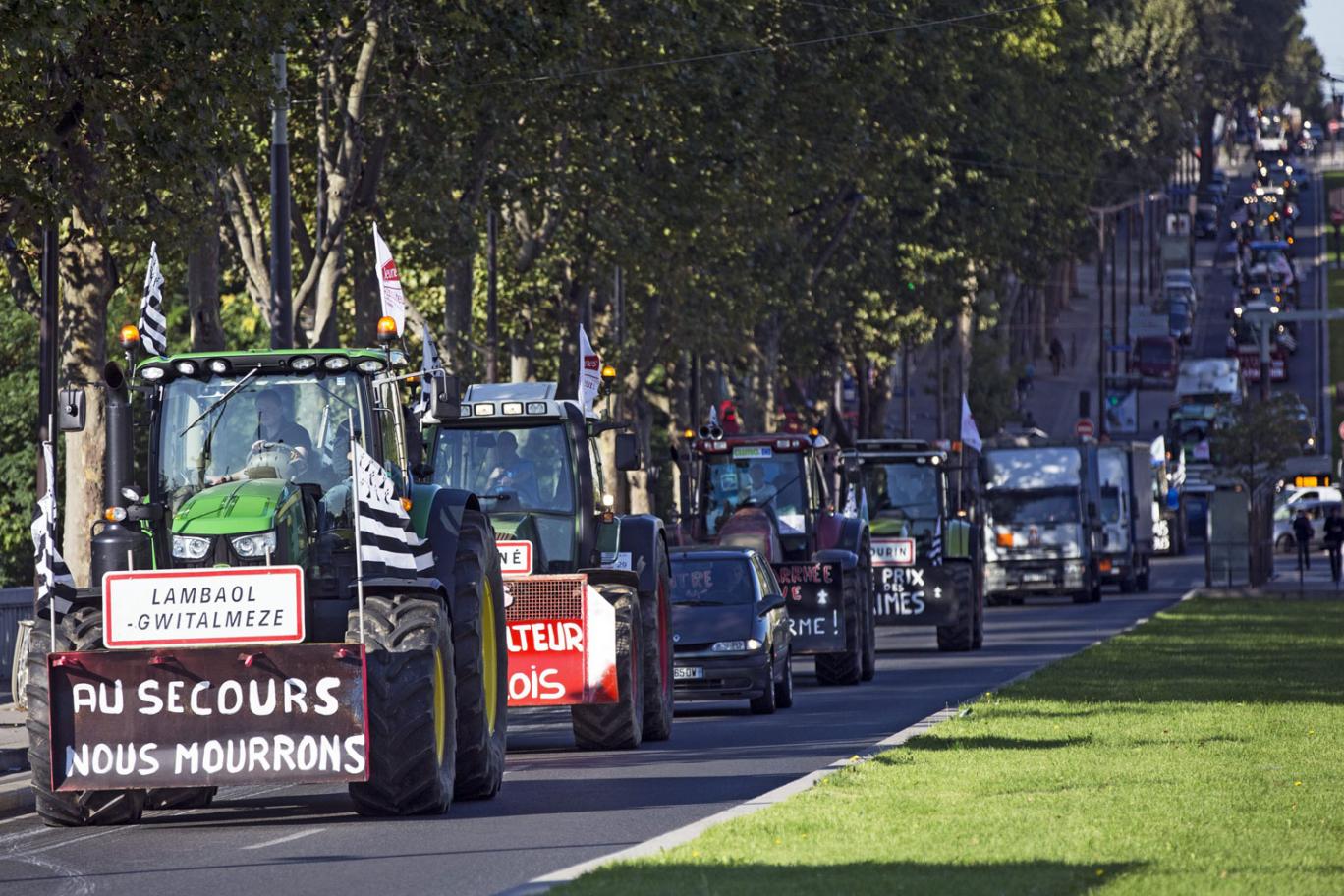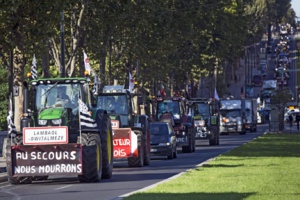Farmers from Brittany and Normandy began to march on the capital on Tuesday. During the unprecedented protest, they brought in the way a half thousand tractors and buses - enough to obstruct traffic on the main thoroughfares. Yesterday morning, traffic jams in the Paris region stretched for 14 kilometers, then reached 70 km, and have exceeded one hundred kilometers by the end of the day. Almost a thousand policemen were mobilized to ensure the safety of the streets. The tractors entered the streets of Paris in the morning, moving at a speed of 30-35 kilometers per hour, slowing the movement of the city and highway.
Arriving at Parisian Place de la Nation, the farmers put up slogans, referring to the fact that taxes and fees put them on an unequal footing with their European counterparts, and big companies, trying to play on the difficulties with sales, violate the minimum purchase prices, which should be controlled by the state. The farmers are also complaining about complexity of European standards, which are designed to standardization, average level and large scales. This is hitting the French farms hardest, as they primarily focus on small and high-quality production, and a maximum variety of products, even within one region.
Yesterday, the leaders of the protesters were received by French Prime Minister Manuel Valls. The main thesis of the discontented: "We need fair prices instead of state aid." This is followed by calls for Stephane Le Foll, Minister of Agriculture, to resign and almost hang himself on a street lamp - French protesters sometimes are very expressive. A special delegation riding the same tractors even entered in the National Assembly.
Prime Minister Valls said in a meeting with the demonstrators that "France will not abandon its farmers." He promised them an investment of € 3 billion, which will be distributed over the next three years, and the year of bank debt and delay payments.
Protesters declared their readiness to remain in Paris until their demands are met. Not all were happy with the promise of the Prime Minister: "It's only money, and we need reform," - they say. Nevertheless, by the end of the day, the peasants once again mounted their tractors and set off on the return journey.
In connection with the problems of agriculture once again were revived debate about the extent to which the situation has exacerbated by the loss of the important Russian market. Yesterday, the leading conservative Le Figaro newspaper has published data on how many loses French agriculture from Russia’s imposed ban on European products. Having received no official response to the government, journalists appealed to those who produce agricultural products. Industry and trade union organizations estimate losses from the embargo differently. It is believed that only stop of pork exports deprives France of € 100 million a year. However, supply has been suspended for several months before the introduction of sanctions and have been associated with the identified in Poland and Lithuania cases of swine plague. According to the French pork producers, their indirect losses could reach € 400 million, in particular due to the fact that an excess of meat on the domestic market reduces the wholesale and retail prices.
Loss of fruit and vegetable producers estimated at € 50 million, agriculture, after the termination of deliveries of dairy products, found ourselves short € 109 million. In addition, the situation is complicated by domestic competition in the EU - the other European countries that are not able to trade with Russia, but are able to maintain lower prices for their goods within Europe, came out on the markets where French suppliers are used to deliver their products, including the market of France.
Arriving at Parisian Place de la Nation, the farmers put up slogans, referring to the fact that taxes and fees put them on an unequal footing with their European counterparts, and big companies, trying to play on the difficulties with sales, violate the minimum purchase prices, which should be controlled by the state. The farmers are also complaining about complexity of European standards, which are designed to standardization, average level and large scales. This is hitting the French farms hardest, as they primarily focus on small and high-quality production, and a maximum variety of products, even within one region.
Yesterday, the leaders of the protesters were received by French Prime Minister Manuel Valls. The main thesis of the discontented: "We need fair prices instead of state aid." This is followed by calls for Stephane Le Foll, Minister of Agriculture, to resign and almost hang himself on a street lamp - French protesters sometimes are very expressive. A special delegation riding the same tractors even entered in the National Assembly.
Prime Minister Valls said in a meeting with the demonstrators that "France will not abandon its farmers." He promised them an investment of € 3 billion, which will be distributed over the next three years, and the year of bank debt and delay payments.
Protesters declared their readiness to remain in Paris until their demands are met. Not all were happy with the promise of the Prime Minister: "It's only money, and we need reform," - they say. Nevertheless, by the end of the day, the peasants once again mounted their tractors and set off on the return journey.
In connection with the problems of agriculture once again were revived debate about the extent to which the situation has exacerbated by the loss of the important Russian market. Yesterday, the leading conservative Le Figaro newspaper has published data on how many loses French agriculture from Russia’s imposed ban on European products. Having received no official response to the government, journalists appealed to those who produce agricultural products. Industry and trade union organizations estimate losses from the embargo differently. It is believed that only stop of pork exports deprives France of € 100 million a year. However, supply has been suspended for several months before the introduction of sanctions and have been associated with the identified in Poland and Lithuania cases of swine plague. According to the French pork producers, their indirect losses could reach € 400 million, in particular due to the fact that an excess of meat on the domestic market reduces the wholesale and retail prices.
Loss of fruit and vegetable producers estimated at € 50 million, agriculture, after the termination of deliveries of dairy products, found ourselves short € 109 million. In addition, the situation is complicated by domestic competition in the EU - the other European countries that are not able to trade with Russia, but are able to maintain lower prices for their goods within Europe, came out on the markets where French suppliers are used to deliver their products, including the market of France.






